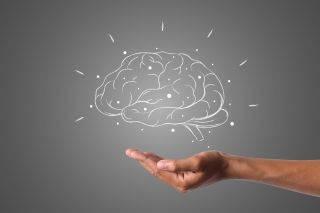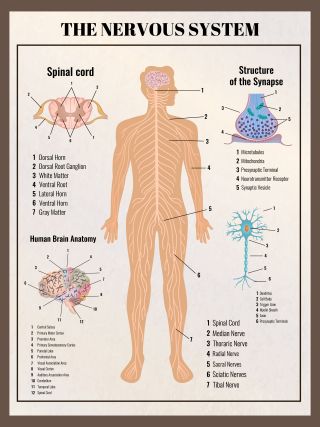Neuroscience
How Our Neurobiology Shapes Our Daily Lives
Neuroscience can help us lead healthier, happier, and more fulfilling lives.
Posted December 6, 2023 Reviewed by Gary Drevitch
Key points
- Our nervous system mediates our perceptions, actions, behaviours, and functions.
- Our neurobiology impacts every aspect of daily life, from health, to emotions, and behaviours.
- Understanding this physiological link is crucial for making successful change.

We are embodied creatures. Although we have a rich inner life, we inhabit a physical world and everything we do is done through our bodies, mediated through the specialized communication network we call the nervous system. Any impairment to this crucial system can have literally paralysing effects, which highlights its importance for our normal functioning: It carries information from sensory organs to the brain and sends signals that control movements to muscle fibres. It also regulates bodily functions like blood pressure and digestion through complex interactions between neural signals and chemical messengers in the blood stream. Without the nervous system, we wouldn’t be aware of anything around us nor be able to talk, move, or even breathe. (Most chemical weapons and poisons used by spy agencies target the nervous system with deadly effects; Cotton, 2018.)

Impacting everyday life
More than just helping us function, the nervous system profoundly influences how we feel, what we perceive, and how we act. This influence is not just an abstract idea but has tangible effects on our everyday lives. Some of these connections are common knowledge; parents understand, for instance, that a child’s irritability may just be a sign of a bad night’s sleep rather than a deep-seated character flaw that needs to be addressed. This insight is supported by studies that have found how sleep is needed for the full functioning of brain networks that help with stress regulation (Zhang et al., 2023) and others that have linked lack of sleep with behavioural problems (Hosokawa et al., 2022; Saghir et al., 2018).
Another example is the concept of being “hangry”—when being hungry results in becoming irritable, bad-tempered, or even outright angry (Spector, 2018). Neuropeptide Y (or NPY for short) is a chemical used to regulate physiological processes including appetite and is released when blood sugar is low (Beck, 2006). Studies have found a direct link between NPY concentrations in the cerebrospinal fluid and compulsive aggressive behaviour (Coccaro et al., 2012), while other researchers have linked low blood sugar to aggressive and even violent behaviour (Bushman et al., 2014). There is further evidence that hunger impacts our emotions (MacCormack & Lindquist, 2019), with evidence that it can trigger irritability, anger, and lowered experience of pleasure (Swami et al., 2022).
Understanding our neurobiology
These examples highlight the importance of understanding our neurobiology. Many arguments could be avoided by just grabbing a snack first and waiting to see if the problem disappears when blood glucose levels have been rebalanced (Kuta, 2022). Similarly, waiting to make an important decision until after a good night’s sleep can dramatically improve the outcome (Mao et al., 2023). However, conventional wisdom does not always take the nervous system into account. Things like weight loss (or gain) are often discussed in terms of discipline and "willpower" related to dieting and exercise. But reality is much more complex, with a myriad of psychological and physiological processes impacting the outcome (Meule & Vögele, 2013). A number of those processes are shaped by the brain and nervous system (Fain, 2016). Many people who successfully shed some pounds struggle to maintain their new weight and often regain it within a short period (Szabo-Reed et al., 2015). Our nervous system plays a big role in this weight cycling, or “yo-yo dieting” (Blatchley, 2023), both through brain responses (van Galen et al., 2023) and with much of the autonomic nervous system (ANS) working to oppose weight loss (Arone et al., 1995). The good news is that weight loss maintenance is possible—if we take our neurobiology into account (Poulimeneas et al., 2018), for example by employing targeted cognitive and behavioural training (Hall & Kahan, 2018).
How neuroscience can help
These examples highlight how our neurobiology is intricately linked to our health, emotions, and behaviours. But the connection runs much deeper still and impacts seemingly non-physiological things like productivity (Duhigg, 2014), learning (Goldberg, 2022), achieving our goals (Berkman, 2018), and interpersonal relationships (Giacomucci, 2021). In all these areas, neuroscience can teach us a lot and help us live healthier, happier, and more fulfilled lives.
References
Arone, L. J., Mackintosh, R. O. N. A. L. D., Rosenbaum, M. I. C. H. A. E. L., Leibel, R. L., & Hirsch, J. (1995). Autonomic nervous system activity in weight gain and weight loss. American Journal of Physiology-Regulatory, Integrative and Comparative Physiology, 269(1), R222-R225. https://doi.org/10.1152/ajpregu.1995.269.1.R222
Beck, B. (2006). Neuropeptide Y in normal eating and in genetic and dietary-induced obesity. Philosophical Transactions of the Royal Society B: Biological Sciences, 361(1471), 1159-1185. https://doi.org/10.1098%2Frstb.2006.1855
Berkman, E. T. (2018). The neuroscience of goals and behavior change. Consulting Psychology Journal: Practice and Research, 70(1), 28-44. https://doi.org/10.1037%2Fcpb0000094
Blatchley, B. (2023). The brain’s role in losing weight and keeping it off. Psychology Today. https://www.psychologytoday.com/us/blog/what-are-the-chances/202303/the-brains-role-in-losing-weight-and-keeping-it-off
Bushman, B. J., DeWall, C. N., Pond Jr, R. S., & Hanus, M. D. (2014). Low glucose relates to greater aggression in married couples. Proceedings of the National Academy of Sciences, 111(17), 6254-6257. https://doi.org/10.1073/pnas.1400619111
Coccaro, E. F., Lee, R., Liu, T., & Mathé, A. A. (2012). Cerebrospinal fluid neuropeptide Y-like immunoreactivity correlates with impulsive aggression in human subjects. Biological psychiatry, 72(12), 997-1003. https://doi.org/10.1016/j.biopsych.2012.07.029
Cotton, S. (2018, Mar 9). Nerve agents: What are they and how do they work? Scientific American. https://www.scientificamerican.com/article/nerve-agents-what-are-they-and-how-do-they-work/
Duhigg, C. (2014). The power of habit: Why we do what we do in life and business. Random House.
Giacomucci, S. (2021). Interpersonal neurobiology, social work, sociometry, and psychodrama. In Social Work, Sociometry, and Psychodrama: Experiential Approaches for Group Therapists, Community Leaders, and Social Workers (pp. 147-164). Springer. https://doi.org/10.1007/978-981-33-6342-7_8
Goldberg, H. (2022). Growing brains, nurturing minds—Neuroscience as an educational tool to support students’ development as life-long learners. Brain Sciences, 12(12), 1622. https://doi.org/10.3390%2Fbrainsci12121622
Hall, K. D., & Kahan, S. (2018). Maintenance of lost weight and long-term management of obesity. Medical Clinics, 102(1), 183-197. https://doi.org/10.1016%2Fj.mcna.2017.08.012
Hosokawa, R., Tomozawa, R., Fujimoto, M., Anzai, S., Sato, M., Tazoe, H., & Katsura, T. (2022). Association between sleep habits and behavioral problems in early adolescence: a descriptive study. BMC Psychology, 10(1), 1-11. https://doi.org/10.1186/s40359-022-00958-7
Kim, M. S. (2022). The neural basis of weight control and obesity. Experimental and Molecular Medicine, 54, 347-348. https://doi.org/10.1038/s12276-022-00759-3
Kuta, S. (2022, Jul 7). Getting ‘hangry’ is real, science suggests. Smithsonian Magazine. https://www.smithsonianmag.com/smart-news/hanger-is-real-science-suggests-180980382/
MacCormack, J. K., & Lindquist, K. A. (2019). Feeling hangry? When hunger is conceptualized as emotion. Emotion, 19(2), 301-319. https://psycnet.apa.org/doi/10.1037/emo0000422
Mao, T., Fang, Z., Chai, Y., Deng, Y., Rao, J., Quan, P., ... & Rao, H. (2023). Sleep deprivation attenuates neural responses to outcomes from risky decision‐making. Psychophysiology, e14465. https://doi.org/10.1111/psyp.14465
Meule, A., & Vögele, C. (2013). The psychology of eating. Frontiers in Psychology, 4, 215. https://doi.org/10.3389/fpsyg.2013.00215
Poulimeneas, D., Yannakoulia, M., Anastasiou, C. A., & Scarmeas, N. (2018). Weight loss maintenance: have we missed the brain?. Brain Sciences, 8(9), 174. https://doi.org/10.3390%2Fbrainsci8090174
Saghir, Z., Syeda, J. N., Muhammad, A. S., Abdalla, T. H. B., & Abdalla, T. H. B. (2018). The amygdala, sleep debt, sleep deprivation, and the emotion of anger: a possible connection?. Cureus, 10(7), e2912. https://doi.org/10.7759%2Fcureus.2912
Spector, N. (2018, Jul 3). The science behind being ‘hangry’. NBC News. https://www.nbcnews.com/better/pop-culture/science-behind-being-hangry-ncna887806
Szabo-Reed, A. N., Breslin, F. J., Lynch, A. M., Patrician, T. M., Martin, L. E., Lepping, R. J., ... & Savage, C. R. (2015). Brain function predictors and outcome of weight loss and weight loss maintenance. Contemporary Clinical Trials, 40, 218-231. https://doi.org/10.1016%2Fj.cct.2014.12.008
van Galen, K. A., Schrantee, A., Ter Horst, K. W., la Fleur, S. E., Booij, J., Constable, R. T., ... & Serlie, M. J. (2023). Brain responses to nutrients are severely impaired and not reversed by weight loss in humans with obesity: a randomized crossover study. Nature Metabolism, 5, 1059-1072. https://doi.org/10.1038/s42255-023-00816-9
Zhang, L., Cui, Z., Huffman, L. G., & Oshri, A. (2023). Sleep mediates the effect of stressful environments on youth development of impulsivity: The moderating role of within default mode network resting-state functional connectivity. Sleep Health, 9(4), 403-511. https://doi.org/10.1016/j.sleh.2023.03.005


